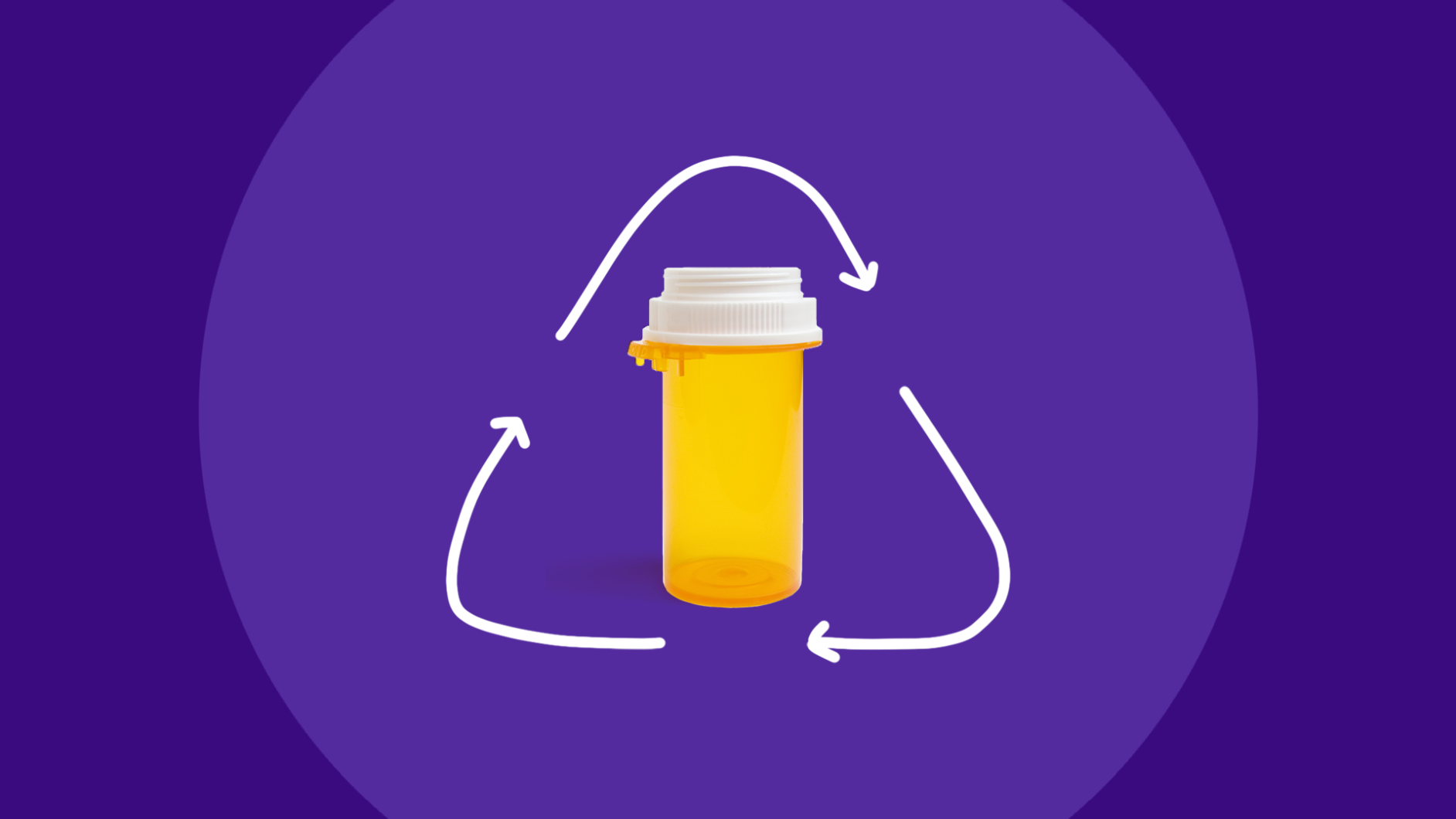Key takeaways
Prescription bottles are difficult to recycle due to their small size and composition. In landfills, they take 20-30 years to degrade.
Some curbside recycling programs and recycling centers accept #5 plastic, and the Gimme 5 program through Preserve allows for recycling at Whole Foods or by mail.
Local pharmacies and pill bottle donation programs offer recycling or reuse options for empty prescription bottles. Be sure to remove any personal information before disposal.
Reusing pill bottles for storage or crafts is a viable alternative to recycling, aligning with environmental care and resourcefulness.
A few decades ago, most people tossed their empty prescription bottles in the trash after they finished their medication. Or if they were of a certain crafty type (like my dear grandmother), they found ways to reuse those bottles. Chances are that you probably don’t keep your thimbles and needles stashed away in your used containers—but how do you dispose of empty prescription bottles? Can you recycle pill bottles?
Healthcare has evolved. Waste management has changed, but those amber-colored plastic bottles are still the same. And they’re not easy to deal with.
Can you recycle pill bottles?
Prescription bottles are made of #5 plastic (which is polypropylene, a recyclable plastic). But their size makes them problematic for many recycling systems, according to Consumer Reports. Many municipal recycling programs with curbside pickup sort their recyclables with a screening device called a trommel. It’s a rotary screen with small holes that is used to sift through material and remove unwanted debris. Bottles, cans, and containers as large as water bottles remain in the trommel for proper recycling, but broken glass, pieces of plastic that are too small to recycle, natural debris such as rocks, and other items fall through the holes and are sent to the landfill. That means your prescription bottles more often than not end up sitting in a landfill—where they can take 20 to 30 years to degrade, according to the Environmental Protection Agency.
Multiply that time frame by the estimated 4 billion prescriptions filled by Americans each year. Then, add in even more over-the-counter medication bottles and you’ve got a lot of plastic languishing for a long time on our planet.
Curbside recycling
To avoid this unfavorable fate for your bottles, ask your curbside recycling program if it accepts prescription bottles. According to Recycle Nation, the curbside programs in Sandy, Utah, and Oklahoma City are rare examples of cities that accept #5 plastic bottles.
Recycling center
A better option is to see if your local recycling center accepts #5 plastic. All the recycling centers in Iowa City, Iowa, and the Shoreway Recycling Center in San Carlos, California, accept and recycle the #5 plastic. If you’re unsure about what recycling services are available near you, you can use 1-800-RECYCLING’s recycling location search tool to find a #5 plastic recycler in your community.
Gimme 5
Number 5 plastics can also be recycled through a service called Gimme 5, a program run by Preserve, which makes consumer products from recycled plastic. They have a few commercial partners, but the biggest by far is Whole Foods Market. The grocer is a major partner in the Gimme 5 initiative and has #5 plastic collection bins in many of its stores. If you do not live near a Whole Foods, you can mail all your #5 plastic to Preserve using the address on its website. There is no charge to recycle these plastics other than the cost of shipping.
If none of these possible recycling initiatives are available near you, then it’s on to the next best options: your pharmacy and pill bottle donation programs.
Pharmacy pill bottle recycling
Although there are no large-scale national recycling programs offered through commercial pharmacies such as Walgreen’s or CVS, small-scale local pharmacies across the country have spurred recycling programs themselves to impressive success. Beaver Health Mart Pharmacy in Beaver, Pennsylvania, has offered a recycling program for customers’ empty vials for more than a decade—tossing the bottles into a bin and partnering with a vendor that shreds and recycles the plastic. Lee’s Inlet Apothecary and Gifts in Murrells Inlet, South Carolina, started a similar program in 2012. Customers are able to hand out their empty containers to pharmacists, who black out their identifying information before sending them to a local recycling facility. (Important note here: Always black out or remove your info on prescription bottles before getting rid of them, no matter what the disposal process looks like).
Pill bottle donation programs
As for donation programs, there are a few that reuse pill bottles in countries where prescriptions are often delivered in paper sacks—where they can’t be protected from contamination or water. Matthew 25: Ministries accepts donations of empty plastic pill bottles for inclusion in shipments of medical supplies and for shredding and recycling. According to its website, their pill bottle program “fulfills the dual needs of improving medical care in developing countries and caring for our environment.”
And if all else fails: Take a note from grandma or this blog post and store tacks, change, or maybe even sewing needles in your empty pill bottles. Reusing is just as good (if not better) than recycling.
- Can I recycle my medication bottles? Consumer Reports (2012)
- How to recycle medicine bottles, Recycle Nation (2014)
- Pill bottle donations, Matthew 25: Ministries
- 20 uses for prescription pill bottles, Crafts by Amanda (2020)




